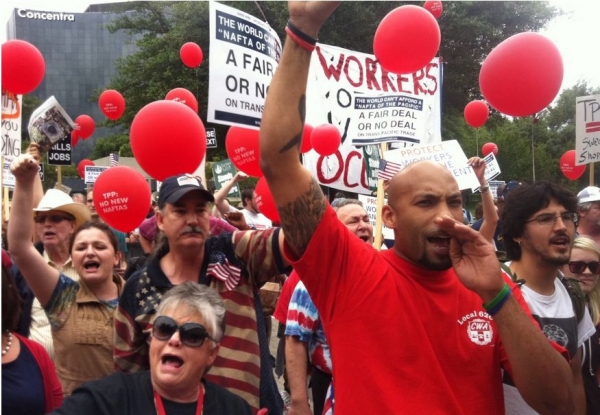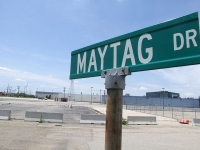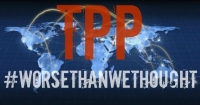
- Home
- About
- Campaigns
- PDA Radio
- Contact Us
- Downloads
- Join Us
- Donate
- Events
- Benefit Kitchen

Stop the Job and Democracy Killing Free Trade Agreements (58)
Statement of Lori Wallach, Director, Public Citizen’s Global Trade Watch on the Demise of the Trans-Pacific Partnership in the Lame-Duck Session of Congress
Written by Lori Wallach | Public CitizenThe news that the White House and Republican congressional leaders have given up on passing the Trans-Pacific Partnership (TPP) is welcome. That the TPP would be defeated by Congress if brought to a vote signals that Trojan-horse “trade” agreements that expand corporate power and shrink Americans’ wages are simply no longer politically viable. People power beat the united forces of a U.S. president, the Republican congressional leaders and the entire corporate lobby.
No, Trump Didn’t Kill the TPP — Progressives Did
Written by Arthur Stamoulis | The MediumIf you read the headlines, Donald Trump’s election has killed the Trans-Pacific Partnership (TPP). The headlines have it wrong.
Who Gets the Gains from Trade
Written by Stan Sorcher | The Huffington PostLet’s start the debate about trade policy on the right foot. Everyone I know is “for” trade. A better question is, “Who gets the gains from trade?”
'Now or Never': Congress Flooded With Calls to Stop TPP on National Day of Action
Written by Nika Knight | Common DreamsA coalition of labor, environmental, civil rights groups and other progressive organizations with millions of members around the country united on Wednesday for a national call-in day to Congress to stop a potential lame-duck vote on the unpopular Trans-Pacific Partnership (TPP) trade deal.
"It's About Letting Giant Corporations Rig the Rules": Warren Skewers TPP
Written by Andrea Germanos | Common DreamsBarack Obama Readies For Final TPP Push, Which Could Benefit Presidential Library Donors
Written by By Ned Resnikoff AND David Sirota | International Business TimesPresident Barack Obama last week renewed his push for the Trans-Pacific Partnership, suggesting that it will be easier to pass the deal after the elections are over. The idea is that lawmakers will then be more insulated from political influence.
This Small Town Shows Why The Trans-Pacific Partnership Could Be A Disaster For American Workers
Written by Peter Cole | In These TimesEvery time politicians look to pass a new free trade agreement like the Trans-Pacific Partnership (TPP), they reassure the American people that this time around, workers will be protected. But my research on and experiences in a small industrial town in Illinois—not to mention even a cursory glance at the broader data on the impact of such deals—reveals that “free trade” has been a nightmare for most of the American people.
“Free Trade”: The Elites Are Selling It But The Public Is No Longer Buying
Written by Dave Johnson | Common Dreams“Free trade”: The elites are selling it but the public is longer buying it. Look at the support for Democrat Bernie Sanders and Republican Donald Trump, especially in light of Sanders’ surprise 20-point comeback in this week’s Michigan primary. With primaries coming soon in Ohio, Illinois, Missouri and North Carolina, will Sanders’ trade appeal resonate again?
As Countries Line Up to Sign Toxic Deal, Warren Leads Call to Reject TPP
Written by Andrea MillerElizabeth Warren warns agreement 'would tilt the playing field even more in favor of big multinational corporations and against working families'
Chamber of Commerce Lobbyist Tom Donohue: Clinton Will Support TPP After Election
Written by Robert Naiman | Huffington Post PoliticsIn an interview from Davos with Bloomberg TV on January 20, Chamber of Commerce President Tom Donohue, a top lobbyist for the pro-corporate-power Trans-Pacific Partnership [TPP] agreement, assured viewers that if Hillary Clinton wins the Presidential election, Clinton will support the TPP, even though she opposes it now.
More...
TPP, Public Comment Period Open!
Written by Jacob Devaney | Huffington PostLast spring and summer we saw an unprecedented social outrage over the fast-tracking of Trans Pacific Partnership legislation. Activists from all sectors converged and spoke with a loud voice against this dangerous "trade" deal. This is important to Americans on both sides of the political aisle as well as anyone concerned with job security, the environment, social justice, or public health. Now the public has an opportunity to weigh-in before it is voted on. The public comment period for TPP is open until January 13, 2016. If you are not already aware of why this is important to you, then just keep reading.
This NAFTA Lawsuit over Keystone XL Proves "Free Trade" Deals Kill Democracy
Written by Sarah Lazare | Common Dreams'The idea that some trade agreement should force us to overheat the planet’s atmosphere is, quite simply, insane.'
Grassroots Groups Beg Scottish MPs to Stop US Corporate Power Grab
Written by Deidre Fulton | Common DreamsCall comes just one day after leaked docs show EU blocking discussion of measures to combat climate change that could 'restrict international trade'
WTO Authorizes Over $1 Billion in Sanctions Unless U.S. Guts Popular Country-of-Origin Meat Labels, Disproving Obama Claim That Trade Pacts Can’t Undermine Public Interest Policies
Written by Public CitizenToday’s World Trade Organization (WTO) ruling against the U.S. country-of-origin meat labels (COOL) that consumers rely on to make informed choices about their food provides a glaring example of how trade agreements can undermine U.S. public interest policies, Public Citizen said today. How the Obama administration responds to the WTO ruling will have a significant impact on its efforts to build congressional and public support for the controversial Trans-Pacific Partnership (TPP).
Latest News
-
Trump administration's voter suppression attempts ahead of midterms are not only 'morally wrong,' they're illegal +
 Imagine going to the polls on Election Day and discovering that your ballot could be collected and reviewed by the… Read More
Imagine going to the polls on Election Day and discovering that your ballot could be collected and reviewed by the… Read More
-
ACLU Blueprints Offer Vision to Cut US Incarceration Rate in Half by Prioritizing 'People Over Prisons' +
 ACLU Blueprints Offer Vision to Cut US Incarceration Rate in Half by Prioritizing 'People Over Prisons' Read More
ACLU Blueprints Offer Vision to Cut US Incarceration Rate in Half by Prioritizing 'People Over Prisons' Read More
-
As Florence Makes Landfall, Poorest Once More Likely to Suffer Most From Storm's Destruction +
 "These disasters drag into the light exactly who is already being thrown away," notes Naomi Klein Read More
"These disasters drag into the light exactly who is already being thrown away," notes Naomi Klein Read More
-
How about some good news? Kansas Democratic Representative advances bill for Native Peoples. +
 How about some good news? Kansas Democratic Representative advances bill for Native Peoples. Read More
How about some good news? Kansas Democratic Representative advances bill for Native Peoples. Read More
-
How One Dying Man Changed The Debate About The Tax Bill +
 What mattered was that he showed up — that he put himself in front of the people whose opinions on… Read More
What mattered was that he showed up — that he put himself in front of the people whose opinions on… Read More
-
Democrats Just Won a Major Victory in Virginia +
 On a night of Democratic victories, one of the most significant wins came in Virginia, where the party held onto… Read More
On a night of Democratic victories, one of the most significant wins came in Virginia, where the party held onto… Read More
-
Repealing the Jim Crow law that keeps 1.5 million Floridians from voting. +
 A seismic political battle that could send shockwaves all the way to the White House was launched last week in… Read More
A seismic political battle that could send shockwaves all the way to the White House was launched last week in… Read More
-
Nuclear Weapons: Who Pays, Who Profits? +
 In an interview with Reuters conducted a month after he took office, Donald Trump asserted that the U.S. had “fallen… Read More
In an interview with Reuters conducted a month after he took office, Donald Trump asserted that the U.S. had “fallen… Read More
-
Sessions issues sweeping new criminal charging policy +
 Attorney General Jeff Sessions overturned the sweeping criminal charging policy of former attorney general Eric H. Holder Jr. and directed… Read More
Attorney General Jeff Sessions overturned the sweeping criminal charging policy of former attorney general Eric H. Holder Jr. and directed… Read More
- 1
- 2












